![]()
Aaron Roth – HOPE International – June 2011
- Download this email as a pdf: Aaron Roth – June 2011 Update.pdf
- Blog and Support Page: www.AaronRoth.net
- HOPE International Worldwide – www.HOPEinternational.org
- Newsletter Archive: AaronRoth.net – Monthly Newsletters
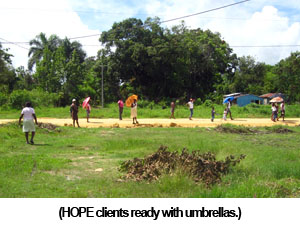 Everything is sweeter during harvest time. I had mangoes for lunch today, and they came from a tree just a few minutes away. Might be the best I’ve ever eaten, and it’s true what they say, you have to savor the fruit when its in season. Here in the Dominican Republic, everything grows, and everything has its harvest time. The way the Dominicans say “zafra” (harvest) around here makes the word sound like it describes a festival where the whole town celebrates with music, dancing, and delicious food. But for the majority of Dominicans, “zafra” really just means “employment.” When food is ripe, it can be gathered and sold, and there is income. Certainly, this is something to celebrate.
Everything is sweeter during harvest time. I had mangoes for lunch today, and they came from a tree just a few minutes away. Might be the best I’ve ever eaten, and it’s true what they say, you have to savor the fruit when its in season. Here in the Dominican Republic, everything grows, and everything has its harvest time. The way the Dominicans say “zafra” (harvest) around here makes the word sound like it describes a festival where the whole town celebrates with music, dancing, and delicious food. But for the majority of Dominicans, “zafra” really just means “employment.” When food is ripe, it can be gathered and sold, and there is income. Certainly, this is something to celebrate.
I’ve been celebrating the rains that have come. Sure, it brings an extra bump in humidity amidst the temperatures of the high 90’s, but wow, when the rain comes, the wind sweeps through the house where I’m staying and it’s more refreshing than air conditioning. I’ve always loved the rain, and this is just another reason to add to the list.
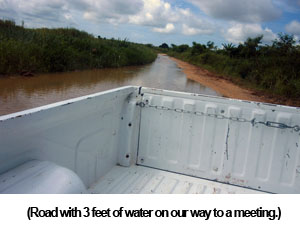 I’ve realized though, that not everyone shares my affinity for it. Rain, in a developing country can make it impossible to do business or travel anywhere. Traffic jams are horrendous, and for some of our branch offices, our community bank meetings are unreachable because of the damage done to roads. (Check the picture to the left to see a road that’s covered in 3 feet of water. We had to drive into the brush to make it to the bank meeting.) Coincidentally, in the sugar cane communities, the rain marks the change from “la zafra” to “el tiempo muerto” (dead time) when harvesting is finished until November.
I’ve realized though, that not everyone shares my affinity for it. Rain, in a developing country can make it impossible to do business or travel anywhere. Traffic jams are horrendous, and for some of our branch offices, our community bank meetings are unreachable because of the damage done to roads. (Check the picture to the left to see a road that’s covered in 3 feet of water. We had to drive into the brush to make it to the bank meeting.) Coincidentally, in the sugar cane communities, the rain marks the change from “la zafra” to “el tiempo muerto” (dead time) when harvesting is finished until November.
What the Rain Can Mean
I think this is a lesson in perspective for me. While I can experience the joy of cooler winds, others know that great rains bring great pains. I live on the second floor of an apartment in the capital city. There’s no dirt floor for the rain to mix with mud, and my windows are made of glass instead of sheet metal with ropes of twine as hinges. When I hear the rain it helps me sleep, but when I’ve talked to clients of ours, they talk about the pounding of the rain on their metal roof homes. For a family sharing one bed in a one room house, the children cry and the parents try to console them back to bed as the thunder and monstrous rain destroy a peaceful night’s sleep.
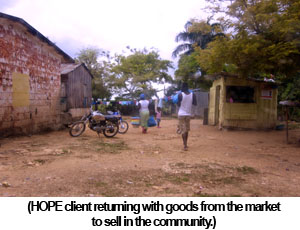 The arrival of the rain brings many lessons and new perspectives about the nature of overseas missions work and the kind of perspective I bring to it as a Westerner, or more aptly named, an Outsider. I’ve realized that as I make my way through these communities doing the work of HOPE, I enjoy everything I learn about the culture. But, I am an observer, I am not a participant. As a volunteer with HOPE, I am not a client of HOPE. I am independent of the local economy; the rise and fall of gasoline prices and their effect on local prices have no consequence to me. How much food I can buy to eat does not depend on the amount of money I make from customers that stop by my stand in the market. Here, on rainy days, people don’t go, or wait to go to the market later in the week. These small changes in consumer behavior can be crippling to the people at the bottom of the economic chain.
The arrival of the rain brings many lessons and new perspectives about the nature of overseas missions work and the kind of perspective I bring to it as a Westerner, or more aptly named, an Outsider. I’ve realized that as I make my way through these communities doing the work of HOPE, I enjoy everything I learn about the culture. But, I am an observer, I am not a participant. As a volunteer with HOPE, I am not a client of HOPE. I am independent of the local economy; the rise and fall of gasoline prices and their effect on local prices have no consequence to me. How much food I can buy to eat does not depend on the amount of money I make from customers that stop by my stand in the market. Here, on rainy days, people don’t go, or wait to go to the market later in the week. These small changes in consumer behavior can be crippling to the people at the bottom of the economic chain.
So when I speak of rain, I speak about it cooling down the humid nights, I don’t speak about it delaying a delivery of goods to my business, or preventing customers from buying my goods which helps to feed my family. I guess I’m learning more to listen, not just to differences in our cultures, but more to the reality of daily living for the clients we serve. Even in the sense of trying to practice sympathy with a client’s plight, they want you to know that even though the rains come and business is slow, the Lord is still faithful, and He will provide. Taking into consideration some of the stories I’ve heard, I could conclude that rain’s destruction is overpowering, but I am reminded daily by our clients, that even the rain has a Master to answer to. Every time I think about the benefit or a problem of something like the rain, I find that there is a greater meaning to it and a breadth of topics that follow. It is becoming clearer to me that we can all approach experiences in dramatically different ways.
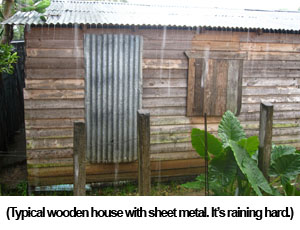
Everything Has its Season
Which brings me back to mangoes. Mangoes are the sweetest right now. You can’t argue with that. You can find them just about everywhere in the markets. But if I were you, I’d ask a Dominican to buy the mangoes for you. You may think that the grocery store has the best mangoes, but honestly, the locals know who’s got the best deal in town and where you can find the freshest delivery. You may think mangoes arrive in cardboard boxes and get stacked in nice neat piles in the fruit aisles, but you might not realize that there’s a mango tree near your residence. You may think that you’ll need a ladder and gloves to get the mangoes, but they can show you how to knock them down with a well-thrown stick.
So when you talk to people about the rain or mangoes or sugar cane, be sure to mention that you are keenly aware of the importance of perspective, or better said, “that everything has its season.” And say it in the way that you understand that in the sweetness of mangoes and in the destruction of rain, “everything has its season.” You’ll probably get a response like I get, “Si, si. Dios sabe lo que pasa. Todo lo que pasa, el sabe y nos da la esperanza por cada dia. Ya, debemos confiar en el.” (Yes, yes, the Lord knows what happens. He knows everything that happens, and he gives us hope every day. We should just put our trust in him.)
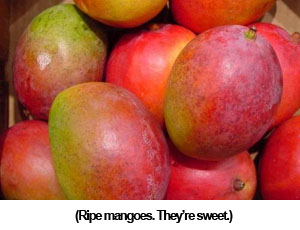 Ecclesiastes 3:1 “There is a time for everything, and a season for every activity under the heavens . . .” . . . “(v. 11) He has made everything beautiful in its time. He has also set eternity in the human heart; yet no one can fathom what God has done from beginning to end. “
Ecclesiastes 3:1 “There is a time for everything, and a season for every activity under the heavens . . .” . . . “(v. 11) He has made everything beautiful in its time. He has also set eternity in the human heart; yet no one can fathom what God has done from beginning to end. “
Blessings,
-Aaron Roth
aroth@hopeinternational.org
www.AaronRoth.net
Skype: aprothwm05


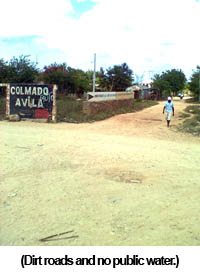 “But are they really going to use the water?” Maybe that’s what went through his head when an American thought about donating a cistern to a poor Haitian community on the outskirts of La Romana, Dominican Republic three years ago. No, wait. He probably didn’t. I think he had the same feeling that I did when he walked past the barbed wire fence and entered through the sheet metal door to the Bethel Church and Primary School: “There is a real need here and we can help.”
“But are they really going to use the water?” Maybe that’s what went through his head when an American thought about donating a cistern to a poor Haitian community on the outskirts of La Romana, Dominican Republic three years ago. No, wait. He probably didn’t. I think he had the same feeling that I did when he walked past the barbed wire fence and entered through the sheet metal door to the Bethel Church and Primary School: “There is a real need here and we can help.”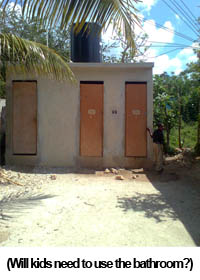
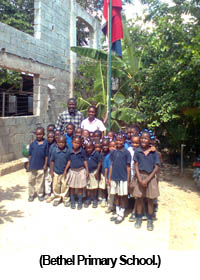
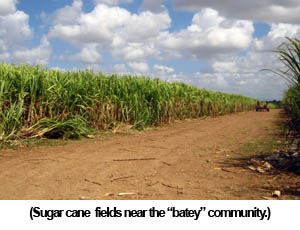 “I used to think sugar came from a box in the supermarket.” I’ve gotten a lot of laughs with that kind of small talk around the topic of sugar, and in particular with that statement. Usually, the Haitians who have emigrated here for employment and work with the sugar cane everyday laugh when they hear it, and ask what else Americans really think. Here in the Dominican Republic, sugar production is still a major export, and if you explore a little bit beyond the major cities you’ll find enormous sugar cane fields, and the sugar cane communities (“bateys”) of people who work in those fields.
“I used to think sugar came from a box in the supermarket.” I’ve gotten a lot of laughs with that kind of small talk around the topic of sugar, and in particular with that statement. Usually, the Haitians who have emigrated here for employment and work with the sugar cane everyday laugh when they hear it, and ask what else Americans really think. Here in the Dominican Republic, sugar production is still a major export, and if you explore a little bit beyond the major cities you’ll find enormous sugar cane fields, and the sugar cane communities (“bateys”) of people who work in those fields.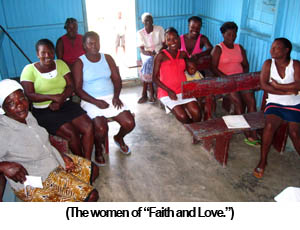 Back in February, I know I made the joke that if the “Lord wants me to learn Creole then I’ll do it.” Now it’s looking like I might actually head down that path. The women of the Bank of Esperanza “Fe y Amor” (Faith and Love) of Batey Community #62 graciously accepted the task of teaching a “gringo” his first few words and phrases in Creole.
Back in February, I know I made the joke that if the “Lord wants me to learn Creole then I’ll do it.” Now it’s looking like I might actually head down that path. The women of the Bank of Esperanza “Fe y Amor” (Faith and Love) of Batey Community #62 graciously accepted the task of teaching a “gringo” his first few words and phrases in Creole.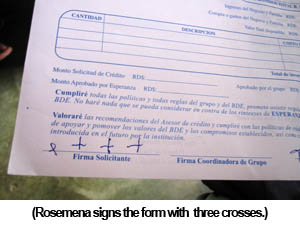 That afternoon Franklin and I went to visit a group of associates’ homes to verify their places of residence and their businesses. We stopped by the house of one woman in the community, Rosemena, to do the survey of poverty. We usually ask for the national identification card or their passport. Rosemena had neither.
That afternoon Franklin and I went to visit a group of associates’ homes to verify their places of residence and their businesses. We stopped by the house of one woman in the community, Rosemena, to do the survey of poverty. We usually ask for the national identification card or their passport. Rosemena had neither.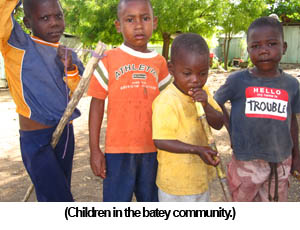 On our way back to the office, we made a quick stop to visit a group of clients. Francisco likes to check in with his HOPE clients to see how their family and business are doing. We pulled up to a house and a young woman came out, holding her child. “Hi Franklin, how are you!” – she yells. Franklin greeted her and introduces me, “This is my American friend who wants to learn Creole.”
On our way back to the office, we made a quick stop to visit a group of clients. Francisco likes to check in with his HOPE clients to see how their family and business are doing. We pulled up to a house and a young woman came out, holding her child. “Hi Franklin, how are you!” – she yells. Franklin greeted her and introduces me, “This is my American friend who wants to learn Creole.”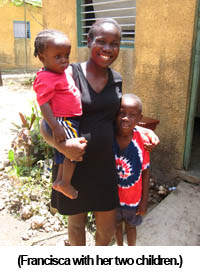 (I pull out my pad of paper to write her name down so I can remember.)
(I pull out my pad of paper to write her name down so I can remember.)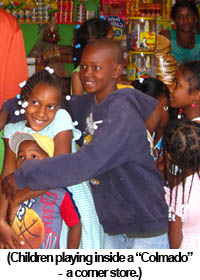 Nearing the completion of two months in the Dominican Republic, I’m feeling like this place is becoming a second home, and while I’m getting used to what life is like here, there are some things about working with the poor that I don’t feel like I’ll get used to. Sure, I’ve been to over 50 of HOPE’s microfinance meetings in the communities, and I’m helping to rewrite and update the training and operations manual. I could walk you through the loan process, how to structure a bank meeting, and how to deliver the Biblical devotionals and business training materials we use. I’m getting used to all that. However, I don’t think I’ll get used to experiencing the look of fear and insecurity I see in the eyes of a new client when I ask them about how much money they have in their savings.
Nearing the completion of two months in the Dominican Republic, I’m feeling like this place is becoming a second home, and while I’m getting used to what life is like here, there are some things about working with the poor that I don’t feel like I’ll get used to. Sure, I’ve been to over 50 of HOPE’s microfinance meetings in the communities, and I’m helping to rewrite and update the training and operations manual. I could walk you through the loan process, how to structure a bank meeting, and how to deliver the Biblical devotionals and business training materials we use. I’m getting used to all that. However, I don’t think I’ll get used to experiencing the look of fear and insecurity I see in the eyes of a new client when I ask them about how much money they have in their savings.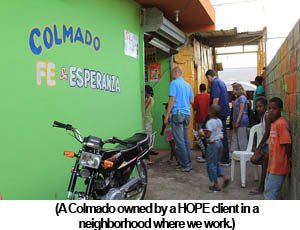 To become a client of HOPE, we require that you attend five business training sessions where a loan officer teaches you about the mission and vision of HOPE, basic business strategies, the structure and the commitment of the loan, and most importantly, and I’ll quote the loan officer, “Even though you may think that God is distant from you, I want to tell you that He has not forgotten about you or your family, He is here in this community.”
To become a client of HOPE, we require that you attend five business training sessions where a loan officer teaches you about the mission and vision of HOPE, basic business strategies, the structure and the commitment of the loan, and most importantly, and I’ll quote the loan officer, “Even though you may think that God is distant from you, I want to tell you that He has not forgotten about you or your family, He is here in this community.”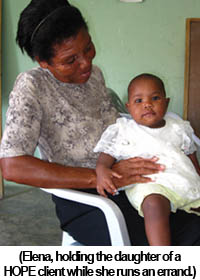 Elena chuckled and said, “I only have one community bank meeting, the rest are the meetings of my friends.”
Elena chuckled and said, “I only have one community bank meeting, the rest are the meetings of my friends.”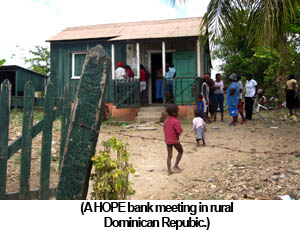 The women who were sitting there with us chuckled as Elena ran toward the other houses. I asked them why they were chuckling, one said, “That’s Elena. She’s always running for something.”
The women who were sitting there with us chuckled as Elena ran toward the other houses. I asked them why they were chuckling, one said, “That’s Elena. She’s always running for something.”


